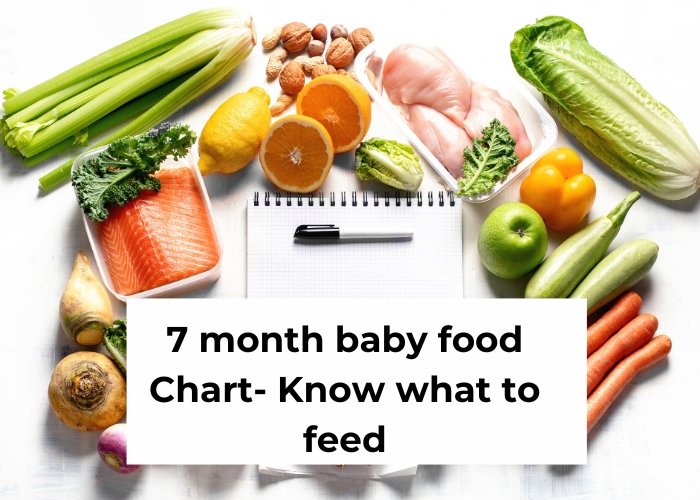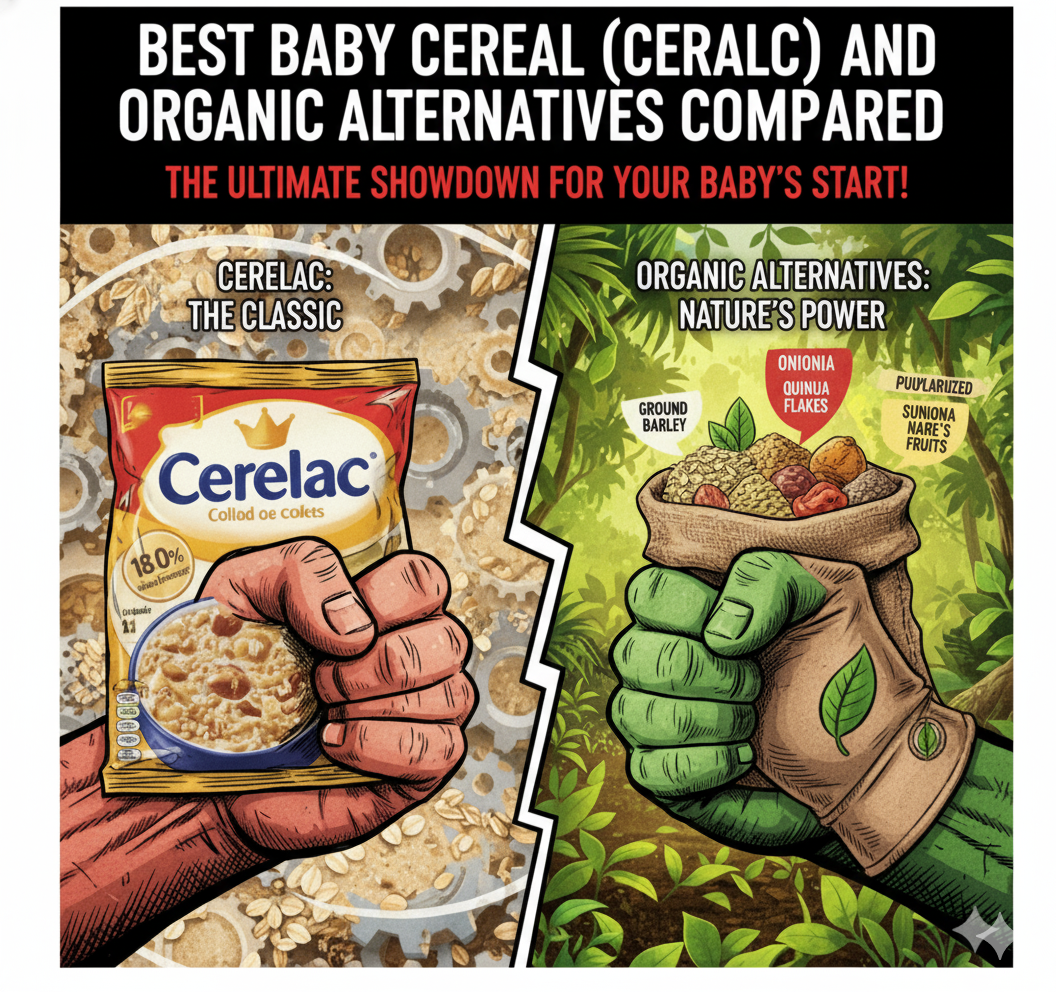
7 Month Baby Food Chart (Indian Recipes, Schedule & Tips)
Topic
7 Month Baby Food Chart (Indian Recipes, Schedule & Tips)
May start as early as
7 months
─────────
7 Month Baby Food Chart: Indian Recipes, Schedule, and Feeding Tips
Introducing solids at 7 months is a big milestone for your baby. By now, your baby is ready for more textures, flavors, and a consistent feeding schedule. This complete guide to 7 month baby food covers Indian recipes, a sample meal plan, quantity guidance, and safe food tips for healthy development.
FREE Baby 7 month baby food App – DOWNLOAD NOW
In this blog we will cover-
- Nutritional Needs at 7 Months
- Signs of Nutritional Deficiencies
- Foods to Introduce for 7 months baby
- A 7 month baby food chart
- Safe Cooking Practices
- Safety precautions for 7 month baby food
So let us begin with nutritional needs at 7 months

Uptodd Baby cereal is Live Now !!
What Foods Can a 7-Month-Old Baby Eat?
At 7 months, babies can eat mashed fruits, pureed vegetables, soft cereals, dal water, and porridges alongside breast milk or formula. These should be smooth, allergen-safe, and easy to digest.
Common 7 month baby food options:
- Mashed banana
- Steamed apple or pear puree
- Suji (semolina) porridge
- Moong dal khichdi
- Rice and carrot mash
- Ragi porridge
- Homemade curd (small amount)
Nutritional Needs at 7 Months
Essential Vitamins and Minerals
- Iron: 11mg daily through iron-fortified cereals and pureed meats
- Calcium: 270mg daily for bone development
- Vitamin D: 400 IU daily for calcium absorption
- Zinc: 3mg daily for immune system support
- Vitamin C: 50mg daily to aid iron absorption
Daily Caloric Requirements
A 7 month old baby typically needs 650-850 calories per day, distributed across:
| Meal Type | Calories | Timing |
| Breastmilk/Formula | 400-500 | Throughout day |
| Solid Foods | 250-350 | 2-3 meals |
Protein and Fat Intake Guidelines
Babies need 11 grams of protein daily, sourced from:
- Pureed meats
- Legumes
- Yogurt
- Egg yolks
Fat requirements are 30-40% of daily calories, primarily from:
- Breast milk/formula
- Avocado
- Olive oil
- Full-fat yogurt
Signs of Nutritional Deficiencies
Monitor for these warning signs:
- Lethargy or weakness (iron deficiency)
- Slow weight gain
- Delayed developmental milestones
- Pale skin or gums
- Frequent infections
Now let us talk about foods that you can introduce

Foods to Introduce for 7 month baby
Best Starter Cereals
- Iron-fortified rice cereal
- Oatmeal cereal
- Barley cereal
- Multi-grain cereal
Single-grain cereals are ideal first foods due to their:
- Easy digestibility
- Low allergy risk
- High iron content
- Smooth texture
Recommended First Vegetables:
| Vegetable | Preparation | Benefits |
| Sweet potato | Steamed & pureed | Rich in vitamin A |
| Carrots | Steamed & mashed | High in beta-carotene |
| Green peas | Pureed | Good protein source |
| Squash | Steamed & mashed | Easy to digest |
Best First Fruits:
- Mashed banana
- Pureed apple
- Stewed pear
- Pureed peach
Protein Rich Options
Begin introducing proteins after successful acceptance of cereals and produce:
- Well-pureed lentils
- Soft-cooked mashed beans
- Pureed chicken
- Greek yogurt (plain)
Remember to introduce new foods one at a time, waiting 3-4 days between each new food to monitor for any allergic reactions. Start with thin, smooth purees and gradually increase texture as your baby becomes comfortable with solids.
Reference- NHS UK
Now when we talk about foods for babies we are often confused about the cooking methods. So let us now talk about them
Homemade 7 Month Baby Food Recipes (Indian Style)
These easy, nutritious recipes can be freshly made at home and adapted as your baby explores new tastes:
Moong Dal Khichdi
- Cook moong dal + rice with turmeric
- Mash well, add a spoon of ghee
Suji Porridge
- Roast semolina in ghee
- Add water, cook to smooth paste
Apple Carrot Puree
- Steam 1/2 apple + 1/2 carrot
- Blend to puree with a little water
Ragi Porridge
- Mix ragi flour with water, boil till thick
- Optionally add mashed banana for sweetness
Each of these recipes fits perfectly into your 7 month baby food chart and supports healthy digestion and weight gain.
Safe Cooking Practices
| Cooking Method | Benefits | Best For |
| Steaming | Preserves nutrients | Vegetables, fruits |
| Boiling | Softens tough foods | Root vegetables, legumes |
| Baking | Enhances natural flavors | Sweet potatoes, apples |
| Pressure cooking | Saves time, retains nutrients | Legumes, tough vegetables |
Essential safety guidelines for food preparation:
- Wash hands thoroughly before handling food
- Clean all utensils and equipment properly
- Cook foods to appropriate temperatures
- Store prepared foods in airtight containers
- Label containers with preparation date
- Refrigerate unused portions within 2 hours
When preparing baby food, always check the temperature before serving and avoid using salt or sugar. Fresh batches can be stored in the refrigerator for up to 48 hours.
Now it’s time to give you all a diet plan for your 7 month baby:
7 month baby food chart
| Time | Meal Type | Food Options | Quantity |
| Morning (6:30 am) | Breastfeeding/Formula Feeding | – | 1 session |
| Mid Morning (8:30 am) | Solid Meal | – Ragi (finger millet) porridge- Mashed ripe banana- Oats porridge (with breastmilk/formula) | 2–3 tbsp |
| Late Morning (11 AM) | Breastfeeding/Formula Feeding | – | 1 session |
| Lunch (1:00 PM) | Solid Meal | – Rice and lentil khichdi (mashed)- Steamed & mashed carrot, pumpkin, or sweet potato- Moong dal soup | 2–3 tbsp |
| Afternoon (3:30 PM) | Breastfeeding/Formula Feeding | – | 1 session |
| Evening (5:30 PM) | Breastfeeding/Formula Feeding | – | 1 session |
| Dinner (7:00 PM) | Solid Meal | – Rice cereal with vegetable puree- Suji (semolina) porridge- Fruit puree (apple, pear, papaya) | 2–3 tbsp |
| Night (9:00 PM) and as required | Breastfeeding/Formula Feeding | – | 1 session |
Precautions to take for 7 month baby food
When we feed our little ones it is imperative we note few precautions to avoid any accidents-
- Start with small portions to prevent overwhelming
- Offer new foods alongside familiar ones
- Wait 3-4 days between introducing new foods
- Stay calm during food refusal
- Keep trying rejected foods (it may take 10-15 attempts)
- Maintain consistent meal schedules.
- Allow messy eating for sensory development
- Keep distractions minimal during meals
- Do not serve nuts, whole grapes, popcorn, hard sweets, or huge chunks of raw fruits and vegetables.
- Eliminate salt, sugar, and processed meals to protect the baby’s kidneys and develop healthy eating habits.
- To lessen the danger of choking, ensure your infant sits upright in a high chair or supported position.
What to Avoid in 7 Month Baby Food
- No salt, sugar, honey, or cow milk
- Avoid spicy, chunky, or raw foods
- Avoid packaged baby foods with preservatives
Common Questions About 7 Month Baby Food
Q1. Can I give curd to my 7-month-old baby?
Yes, homemade curd in small amounts is safe and good for digestion.
Q2. What fruits can be included in 7 month baby food?
Banana, apple, pear, papaya, and steamed chikoo are ideal.
Q3. Is dal water enough for lunch?
It’s a great start! Gradually add mashed rice to make a full meal.
Q4. How do I know if my baby is full?
Look for signs like turning away, spitting food, or refusing spoon.rt also provides probiotics.
Q6. How do I introduce and monitor for food allergies?
Always introduce one new food at a time and wait 2–3 days before adding another. Watch for signs like rashes, digestive upset, or fussiness before moving on. This cautious approach helps identify triggers.
Q7. Can solid food replace milk feeds at 7 months?
No. Breastmilk or formula remains the primary nutrition source until at least 12 months. Solids supplement – not replace – milk. Continue offering milk feeds regularly throughout the day.
Q8. Is homemade baby food better than commercial jar food?
Homemade foods offer control over ingredients and texture. If using commercial jarred foods, choose plain, low‑salt, no added sugar options. Homemade is fine provided hygiene and proper cooking methods are followed.
Q9. What mistakes should caregivers avoid at this stage?
- Introducing too many new foods at once
- Skipping observation periods for food reactions
- Over salting or over-spicing food
- Offering inappropriate textures (hard chunks or choking risks)
- Expecting solids to replace milk too early
Q10. How should portions progress during 7th month?
Start with 2 – 3 tablespoons per meal, increasing gradually based on appetite and tolerance. By the end of the month, many babies can handle 3 – 4 tablespoons per sitting, especially as part of three meals plus snacks.
Helpful Related Guides
To support your baby’s full nutrition journey:
6 Month Baby Food Guide – Start solids the right way
1 Year Baby Food Ideas – Transition to toddler meals
Baby Weight Gain Foods (6–12 Months) – For healthy development
👉 Read about food chart guide for 0-3 years
Explore UpTodd to unleash hidden abilities of the baby.






